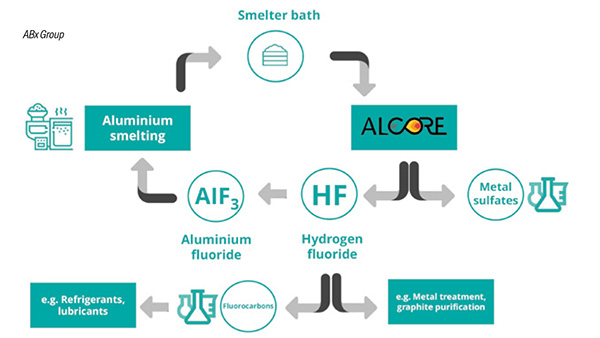Aluminum smelting operations require molten cryolite, also commonly called bath, to serve as the electrolyte and dissolve alumina. A typical smelter produces excess bath over time, and there are few markets for reuse or recycle of this material, especially as there are now few smelters being built globally. Global aluminum producers are eager for alternative applications for excess bath to avoid onsite storage or transport to a landfill. A new pilot plant in Tasmania will demonstrate a world-first chemical process for producing hydrogen fluoride (HF) from bath. Alcore, a majority-owned subsidiary of ABx Group Ltd. (South Melbourne, Australia; www.abxgroup.com.au), plans to construct its pilot plant adjacent to Rio Tinto’s Bell Bay aluminum smelter in northern Tasmania. “We know of a very small number of efforts globally to investigate reprocessing aluminum smelter bath, but there is currently no commercial technology to do so,” explains Mark Cooksey, managing director and CEO of ABx Group.
Low-cost production of HF is especially valuable in the aluminum industry, because it can be readily converted into aluminum fluoride, which is essential for aluminum metal production. Some 50% of the fluorine used in smelting is lost with the smelter bath. Since the bath is a relatively low-cost waste, the process will have lower operating costs when compared to other HF production methods, such as the widely used fluorspar process. Besides the bath itself, the main feedstock for the process is sulfuric acid. The reaction occurs at moderate temperatures and produces HF, as well as an aluminum/sodium sulfate solid product, says Cooksey.

In Australia, all HF is currently imported, so a domestic source — especially one produced from an abundant waste product — is of great value. Following the pilot plant in Bell Bay, Alcore intends to construct a commercial-scale aluminum fluoride plant that will convert the bath-based HF into aluminum fluoride. “We have demonstrated the process in a batch pilot reactor, involving approximately 10 kg of smelter bath and sulfuric acid,” says Cooksey. The new pilot plant is expected to continuously process around 1,600 tons/yr of smelter bath, and commissioning is planned for early 2026.